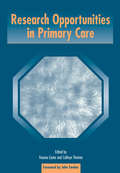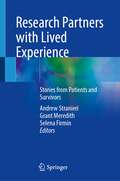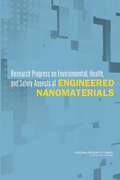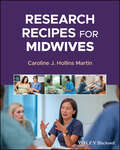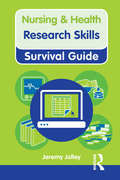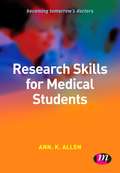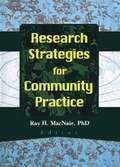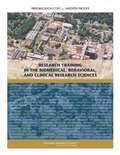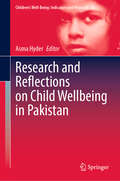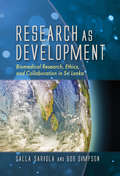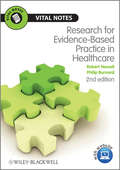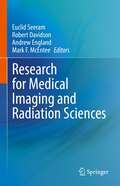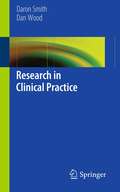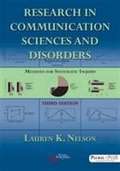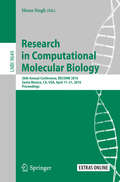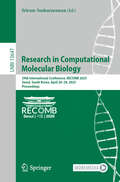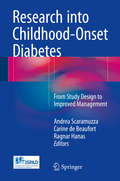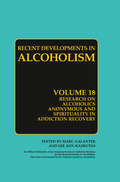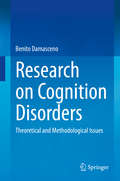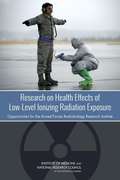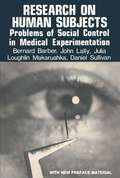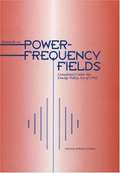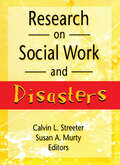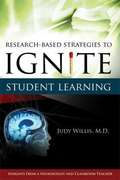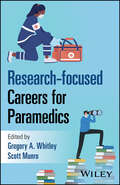- Table View
- List View
Research Opportunities in Primary Care
by Kate Thomas Yvonne Carter'Medical technology is beneficial for well researched dangerous diseases. However, most symptoms that people bring to their primary care physician have no single clearly identifiable cause: investigations and drugs do more harm than good - and also waste resources - ' - Wilfrid Treasure Diagnosis and Risk Management in Primary Care teaches that adopting an evidence-based approach to primary care improves patient care and treatment outcomes. It demonstrates that brief clinical assessments, repeated if necessary, allow effective diagnosis while avoiding the costs and complications associated with more advanced testing. Adopting a fresh approach, this book sets consultation skills alongside evidence-based information by both itemising the specific techniques and facts that are needed in the consulting room, and providing detailed information on odds and likelihood ratios to quantify risk and deal with uncertainty. This book provides food for thought, and helps doctors develop communication skills that support their personal styles of consulting, encouraging a more traditional, intuitive treatment. It provides a map of the consultation and a compass to navigate through symptoms, signs and evidence - listening to their patients with one ear and, with the other, to the reflective inner voice of reason. General Practitioner Specialist Trainees and their teachers will find much of interest, as will established General Practitioners with an interest in maintaining traditional models of care. Undergraduate medical students and candidates for the MRCGP will find this an ideal reader for the clinical skills assessment. 'What a breath of fresh air to find an author capable of putting the patient back at the centre of the consultation and who is able to entertain at the same time as he informs and to stimulate critical reflection while nudging us in the direction of a rigorous approach to diagnosis, and the assessment and communication of risk.' From the foreword by Roger Jones
Research Partners with Lived Experience: Stories from Patients and Survivors
by Andrew Stranieri Grant Meredith Selena FirminThis book aims to foster collaborations between patients who have intense lived experience with a medical condition or family violence and researchers investigating them. Inviting patients or survivors into the research team is found to have significant advantages, and chapters review the literature on the benefits they can bring to investigative research teams. The collaboration can take place at multiple stages of research from helping to research design, participating in co-investigators, contributing to the interpretation of results, etc. The conditions addressed in this book include medical conditions from anxiety, postural orthostatic tachycardia syndrome, lupus, asthma, chronic kidney disease, etc. The authors are higher degree students, academics, and active research team members who share their experiences. This is be instrumental in helping patients and survivors decide whether to transition to research. It will also support research team leaders in determining how to benefit from the new perspectives researchers with lived experience bring. The personal narratives provide insight into the challenges and rewards of having lived experience while conducting research. This book is a valuable resource for researchers in clinical fields who have been touched by firsthand exposure to a condition and have been motivated to conduct research in the respective fields. The chapters will enrich understanding for adult patients and survivors and for parents of children suffering intense experiences, who engage with the latest research publications. It will also broaden the understanding of medical, biomedical, and health sciences students interested in reading the narrative accounts of patients and survivors. Readers will gain refreshing perspectives and insights. The book relates to patients managing all kinds of noncommunicable diseases or experiences of violence, and how they can share their valuable experiences into future advancementto research. It is related to SDG 3, good health and well-being.
Research Progress on Environmental, Health, and Safety Aspects of Engineered Nanomaterials
by Toxicology Committee to Develop a Research Strategy for Environmental StudiesDespite the increase in funding for research and the rising numbers of peer-reviewed publications over the past decade that address the environmental, health, and safety aspects of engineered nanomaterials (ENMs), uncertainty about the implications of potential exposures of consumers, workers, and ecosystems to these materials persists. Consumers and workers want to know which of these materials they are exposed to and whether the materials can harm them. Industry is concerned about being able to predict with sufficient certainty whether products that it makes and markets will pose any environmental, health or safety issues and what measures should be taken regarding manufacturing practices and worldwide distribution to minimize any potential risk. However, there remains a disconnect between the research that is being carried out and its relevance to and use by decision-makers and regulators to make informed public health and environmental policy and regulatory decisions. "Research Progress on Environmental, Health, and Safety Aspects of Nanomaterials" evaluates research progress and updates research priorities and resource estimates on the basis of results of studies and emerging trends in the nanotechnology industry. This report follows up the 2012 report "A Research Strategy for Environmental, Health, and Safety Aspects of Engineered Nanomaterials," which presented a strategic approach for developing the science and research infrastructure needed to address uncertainties regarding the potential environmental, health, and safety risks posed by ENMs. This new report looks at the state of nanotechnology research, examines market and regulatory conditions and their affect on research priorities, and considers the criteria for evaluating research progress on the environmental, health, and safety aspects of nanotechnology.
Research Recipes for Midwives
by Caroline J. Hollins MartinResearch Recipes for Midwives A 16-step guide to writing a research proposal Development of a research question, identification of a research method, and working through the steps to build a sample are complex and hugely important stages in the career of a student midwife. A good research ‘recipe’—a specific method geared to address a certain kind of question—can be critical to the creation of a successful proposal. Research Recipes for Midwives offers a selection of thoroughly tested research methods from which student midwives can choose in developing their own projects, expertly directing the reader through a 16-step process for applying a ‘recipe’ to their own proposal. Reader will also find: Information regarding the relationship between midwifery research and practice A thorough introduction to research methods built around clear concepts Tools for making a complex and challenging process manageable and exciting Research Recipes for Midwives is the ideal resource for student midwives developing research proposals, particularly those enrolled in research methods modules, providing readers with an edge in this foundational element of the research process.
Research Skills (Nursing and Health Survival Guides)
by Jeremy JolleyDo you need to conduct or understand research to support your studies or evidence-based practice in healthcare? Ensure that you have all the research tools at your finger tips with this quick reference guide covering both quantitative and qualitative research.
Research Skills for Medical Students (Becoming Tomorrow′s Doctors Series)
by Ann AllenThe revised Tomorrow′s Doctors makes it clear that doctors need to be aware of their responsibilities as scholars and scientists and it is therefore vital that students develop excellent research skills. Whilst there are many ′research skills′ books, medical students frequently struggle with understanding the difference between the practices of research, audit, service evaluation, systematic and narrative reviews and when and how to apply them. This book addresses the kinds of questions novice investigators always ask and helps students utilise study designs, data collection tools and analysis effectively.
Research Strategies for Community Practice
by Ray H MacnairIn Research Strategies for Community Practice, you’ll discover how you can more effectively work together with other practitioners and researchers in the interests of knowledge development and practice assessment. You’ll also gain access to the conceptual rationale, research design process, and research utilization process necessary for success in the context of community organizing.Research Strategies for Community Practice raises crucial issues for you and other community practitioners. In chapters on historical research strategies, you’ll discover the need for reform in research procedures, which will aid you in setting goals, establishing political agendas, and exploring new policy directions. In the chapters covering community network analysis, you’ll find human service and support systems. Specifically, your understanding of this vital area of community practice will develop and flourish in these and many other important areas: uses of historical research assessment, planning, and evaluation through network analysis single system research design the research process in community-based empowerment systems collaborative research participants in the context of adolescent healthReaders from all backgrounds, including doctoral students in social work, sociology, and public administration who have an interest in community practice, will want to take a look inside the proven techniques and sound research in Research Strategies for Community Practice. You’ll find a practical community of professional researchers and practitioners who have compiled the most successful strategies for conducting and bettering research in your community practice.
Research Training in the Biomedical, Behavioral, and Clinical Research Sciences
by National Research Council of the National AcademiesComprehensive research and a highly trained workforce are essential for the improvement of health and health care both nationally and internationally. Over the past 40 years the National Research Services Award (NRSA) Program has played a large role in training the workforce responsible for dramatic advances in the understanding of various diseases and new insights that have led to more effective and targeted therapies. In spite of this program, the difficulty obtaining jobs after the postdoc period has discouraged many domestic students from pursuing graduate postdoc training. In the United States, more than 50 percent of the postdoc workforce is made up of individuals who obtained their Ph.D.s from other countries. Indeed, one can make a strong argument that the influx of highly trained and creative foreigners has contributed greatly to U.S. science over the past 70 years. Research Training in the Biomedical, Behavioral, and Clinical Research Sciences discusses a number of important issues, including: the job prospects for postdocs completing their training; questions about the continued supply of international postdocs in an increasingly competitive world; the need for equal, excellent training for all graduate students who receive NIH funding; and the need to increase the diversity of trainees. The book recommends improvements in minority recruiting, more rigorous and extensive training in the responsible conduct of research and ethics, increased emphasis on career development, more attention to outcomes, and the requirement for incorporating more quantitative thinking in the biomedical curriculum.
Research and Reflections on Child Wellbeing in Pakistan (Children’s Well-Being: Indicators and Research #30)
by Asma HyderThe essays in this collection explore the multifaceted crises affecting children in Pakistan, emphasizing the urgent need for intervention. The chapters address a wide range of themes, from the quality of immunization and education to more intricate issues within homes and family settings, such as indoor air pollution, parental smoking and substance use, and child marriages. Broader societal challenges, including the impact of developmental projects, conflicts, and climate change, are also examined. This book aims to offer innovative and evidence-based insights to professionals, researchers, students, and NGOs with an interest in child welfare. It serves as a resource for those looking to prioritize children’s wellbeing in their future research endeavors. By integrating perspectives from diverse social science disciplines into a single volume, the book contributes significantly to the empirical literature on children’s issues in the Pakistani context.
Research as Development: Biomedical Research, Ethics, and Collaboration in Sri Lanka
by Robert Simpson Salla SariolaIn Research as Development, Salla Sariola and Bob Simpson show how international collaboration operates in a setting that is typically portrayed as "resource-poor" and "scientifically lagging." Based on their long-term fieldwork in Sri Lanka, Sariola and Simpson bring into clear ethnographic focus the ways international scientific collaborations feature prominently in the pursuit of global health in which research operates "as" development and not merely "for" it. The authors follow the design, inception, and practice of two clinical trials: one a global health charity funded trial and the other a pharmaceutical industry-sponsored trial. Research as Development situates these two trials within their historical, political and cultural contexts and thus counters the idea that local actors are merely passive recipients of new technical and scientific rationalities. While social studies of clinical trials are beginning to be an established niche in academic writing, Research as Development helps fill important gaps in the literature through its examination of clinical research situated in cultures in low-income settings. Research as Development is noteworthy for the way it highlights the critical and creative role that local researchers play in establishing international collaborations and making them work into locally viable forms. The volume shows how these clinical and research interactions bring about changes in culture, technologies and expertise in Sri Lanka, contexts that have not previously been written about in any detail.
Research for Evidence-Based Practice in Healthcare (Vital Notes for Nurses #8)
by Robert Newell Philip BurnardThis is an essential, accessible introduction to the practicalities of research and evidence-based practice aimed at all pre-registration nursing and healthcare students. It places research and evidence in the context of clinical practice, introduces the main methodological approaches in qualitative and quantitative research, and describes the processes of research appraisal, dissemination and implementation. The new edition of Research for Evidence-Based Practice in Healthcare has been updated to include information for a broader health care audience. It engages students with the research and evidence agenda, demonstrates the relevance of research and evidence to nursing practice, and provides the skills needed to explore these areas in greater detail. Special features: · A practical guide to research methods and evidence-based practice · New edition of a successful student textbook · Includes a glossary of common research terms · Provides case studies, key points, further reading, and activities throughout · Accompanying website with links to further reading
Research for Medical Imaging and Radiation Sciences
by Robert Davidson Euclid Seeram Andrew England Mark F. McEnteeThis book addresses essential principles of research according to the scientific method for medical imaging technology research. The scope of this book covers the nature of scientific research; quantitative and qualitative approaches essentials; research planning; literature review fundamentals; research methods; data collection, analysis, and interpretation; and communicating research findings. The book meets the educational requirements on Research Principles and Concepts (for entry to practice) of the following professional radiologic technology associations: the American Society of Radiologic Technologists (ASRT), the Canadian Association of Medical Radiation Technologists (CAMRT), the College of Radiographers in the United Kingdom, and radiography societies and associations in Asia, Australia, Europe, and Africa. This is an ideal book for radiologic technologists, nuclear medicine technologists, and radiation therapists seeking to get started in research in their profession. Additionally, biomedical imaging engineering technologists, radiologists, and medical imaging physicists may use this as a “guiding principles” textbook.
Research in Clinical Practice
by Dan Wood Daron SmithResearch in Clinical Practice is a neat, pocket-sized reference guide examining how to get the most from actively participating in research. Including how to begin, avoiding pitfalls, whom to approach and what questions to ask - all significant practicalities for conducting research in the reader's area of interest. Each reader will learn how to make the best use of such a valuable time. Written by two experienced surgeons, both of whom achieved post graduate research degrees, Research in Clinical Practice, is an essential tool for clinicians embarking on a research project as well as those who are new to supervising researchers.
Research in Communication Sciences and Disorders: Methods for Systematic Inquiry
by Lauren K. NelsonIncorporating the recent information on evidence based practice. Updating the statistics chapter with additional contemporary procedures. Revising the chapter on research design.
Research in Computational Molecular Biology
by Mona SinghThisbook constitutes the proceedings of the 20th Annual Conference on Research inComputational Molecular Biology, RECOMB 2016, held in Santa Monica, CA, USA, inApril 2016. The 15 regular papers presented in this volume were carefullyreviewed and selected from 172 submissions. 20 short abstracts are included inthe back matter of the volume. They report on original research in all areas ofcomputational molecular biology and bioinformatics.
Research in Computational Molecular Biology: 29th International Conference, RECOMB 2025, Seoul, South Korea, April 26–29, 2025, Proceedings (Lecture Notes in Computer Science #15647)
by Sriram SankararamanThis book constitutes the proceedings of the 29th Annual International Conference on Research in Computational Molecular Biology, RECOMB 2025, held in Seoul, South Korea, during April 26–29, 2025. The 14 full papers and 41 short papers were carefully reviewed and selected from 339 submissions. They focus on advances in computational biology and applications in molecular biology and medicine. The conference aims at bridging the computational, mathematical, statistical, and biological sciences, and bringing together researchers, professionals, students and industrial practitioners from all over the world for interaction and exchange of new developments in all areas of bioinformatics and computational biology.
Research into Childhood-Onset Diabetes
by Andrea Scaramuzza Carine De Beaufort Ragnar HanasThis book offers a detailed update on research into diabetes with onset in childhood or adolescence. The coverage ranges from fundamental aspects such as study design and statistical analysis through to new ideas for research, the latest research findings, and implications of these findings for clinical care in childhood. Examples of topics addressed in this context include the prevention of diabetic complications, management of micro- and macrovascular complications, the roles of nutrition and exercise, insulin therapy, islet transplantation, and risky behaviors in teenagers. Attention is also focused on the latest technologies, including the artificial pancreas and continuous glucose monitoring, and associated regulatory aspects. The reader will find novel insights into the ways in which research is impacting on clinical management as well as advice on methodology and stimulating ideas on future research areas. The book is based on presentations delivered at the 15th ISPAD (International Society for Pediatric and Adolescent Diabetes) Research School for Physicians, held in Milan. It will be of interest for all diabetologists, pediatricians, dietitians, biomedical engineers, nurses, and students.
Research on Alcoholics Anonymous and Spirituality in Addiction Recovery
by Marc Galanter Lee Anne KaskutasIt was once taken for granted that peer-assisted groups such as Alcoholics Anonymous had no "real" value in recovery from addiction. More recently, evidence-based medicine is recognizing a spiritual component in healing--especially when it comes to addiction. The newest edition of Recent Developments in Alcoholism reflects this change by focusing on the 12-step model of recovery as well as mindfulness meditation and other spiritually oriented activity. More than thirty contributors bring together historical background, research findings, and clinical wisdom to analyze the compatibility of professional treatment and nonprofessional support, day-to-day concepts of relapse prevention, the value of community building in recovery, and much more. Among the topics covered: (1) How and why 12-step groups work. (2) The impact of the spiritual on mainstream treatment. (3) The impact of AA on other nonprofessional recovery programs. (4) AA outcomes for special populations. (5) Facilitating involvement in 12-step programs. (6) Methods for measuring religiousness and spirituality in alcohol research. Whether one is referring clients to 12-step programs or seeking to better understand the process, this is a unique resource for clinicians and social workers. Developmental psychologists, too, will find Volume 18--Research on Alcoholics Anonymous and Spirituality in Addiction Recovery a worthy successor to the series.
Research on Cognition Disorders: Theoretical and Methodological Issues
by Benito DamascenoResearch on cognitive disorders is challenging due to the complexity of functions and numerous variables involved. The main purpose of this book is to effectively address the methodological issues and controversies in cognitive disorders research. First, it reviews the concept of human cognition as a complex activity involving interconnected mental and cerebral processes (its systemic structure), which represent the natural and social-cultural world by means of signs (its mediated, semiotic nature) and result from the internalization (or appropriation by the individual) of external actions and relations with things and persons (its cultural-historical origin). Subsequently, methodological issues are examined, including the use of the systemic and network approach in neuropsychological research, the concepts of single and double dissociation, single-case versus group studies, problems of brain-behavioral correlations using the lesion method and functional neuroimaging, the influence of task-relevant variables (confounders) related to the patient (e.g., age, education), to the lesion (size, etiology), and to the tests and testing conditions (ecological validity, examiner´s experience). Finally, readers are given the fundamentals of statistics applied to biomedical and psychological research, with illustrative examples of how to calculate Z score, effect size, χ2 test, t test, Pearson´s correlation coefficient, and simple linear regression. Methodological problems in current cognitive research on early multiple sclerosis, medial temporal lobe epilepsy, mild cognitive impairment and dementia are examined in detail.
Research on Health Effects of Low-Level Ionizing Radiation Exposure: Opportunities for the Armed Forces Radiobiology Research Institute
by Committee on Research Directions in Human Biological Effects of Low-Level Ionizing RadiationIt is probably only a matter of time before we witness the next event in which large numbers of people are exposed to ionizing radiation. In the past, planning a response to such an occurrence would have likely focused on the management of casualties from high-dose exposure. However, more recently, a different threat has come to the fore: accidental (through a containment breach in a nuclear power plant, for example) or intentional (via a "dirty bomb") releases of radioactivity resulting in low-dose exposure to a population. The magnitude of the health risks arising from low-dose radiation exposure is uncertain, and this uncertainty has significant economic implications for public health decision making. "Research on Health Effects of Low-Level Ionizing Radiation Exposure" examines recent scientific knowledge about the human effects of exposure to low-dose radiation from medical, occupational, and environmental ionizing-radiation sources. This report is intended to provide advice to the Armed Forces Radiobiology Research Institute (AFRRI) about its role in low-dose radiation health effects research. The report identifies current research directions in radiobiological science and assesses how AFRRI programs are advancing research along these directions. The recommendations of "Research on Health Effects of Low-Level Ionizing Radiation Exposure" will provide guidance for AFRRI to build on its strengths and advance its mission while contributing to the body of scientific knowledge on the health effects of exposure to low-dose ionizing radiation.
Research on Human Subjects: Problems of Social Control in Medical Experimentation
by Bernard Barber, John J. Lally, Julia Loughlin Makarushka and Daniel SullivanThe use of human subjects in biomedical research has increased rapidly with scientific discoveries. However, the failure to achieve the highest - or even adequate - standards of professional moral concern and behavior is a serious side effect. Research on Human Subjects is based on four years of intensive research in which two studies were completed - one on a nationally representative sample of biomedical research institutions, the second on a sample of 350 researchers who actually used human subjects. The authors explore prevalent ethical norms, the actual ethical behavior of scientists, and the dilemma between the values of humane therapy and scientific discovery. They document the inadequate training that biomedical researchers receive in the ethics of research on human subjects, not only in medical schools but in post-graduate training as well. This landmark work makes very specific suggestions for policy change and reform for the biomedical research profession and its employment of human subjects.
Research on Power-Frequency Fields: Completed Under the Energy Policy Act of 1992
by National Research CouncilA report on Research on Power-Frequency Fields
Research on Social Work and Disasters
by Calvin StreeterOver the past decade, several major natural disasters have had devastating impacts throughout the United States and the world. Since larger populations now live and work on land vulnerable to various hazards, natural disasters can be expected to affect more people each year. As a result, the social work profession soon will be stretched to its limi
Research-Based Strategies to Ignite Student Learning: Insights from a Neurologist and Classroom Teacher
by Judy WillisIn this book, Judy Willis combs through brain research and pulls out the information that is most valid and relevant to classroom teaching. Find out how to enhance your students' memory and test-taking abilities. And discover ways to captivate and hold students' attention and encourage their participation and progress.
Research-focused Careers for Paramedics
by Scott Munro Gregory A. WhitleyPractical guidance for aspiring and established clinical academic paramedics In Research-focused Careers for Paramedics, a team of distinguished paramedic researchers provide practical guidance to support clinical academic career development. Written to support paramedics across the globe who have an interest in research, this book offers a guide through the stages of a research-focused career, from novice to expert. Supported by international case studies from 15 paramedics at various stages of their own research-focused career, this book provides real-world guidance for aspiring and established clinical academic paramedics. Readers will find: Expert advice on career development, mentorship, networking and funding applications for research grants and fellowshipsComprehensive explorations of the paramedic education systems across multiple countries Practical discussions of the authors’ four-stage career model of paramedic research: novice, competent, proficient, expertReal-world case studies shedding light on the opportunities and challenges posed by each stage of the paramedic research career model Perfect for practicing paramedics with an interest in research, Research-focused Careers for Paramedics will also benefit students of paramedicine and researchers with a background in paramedicine.
